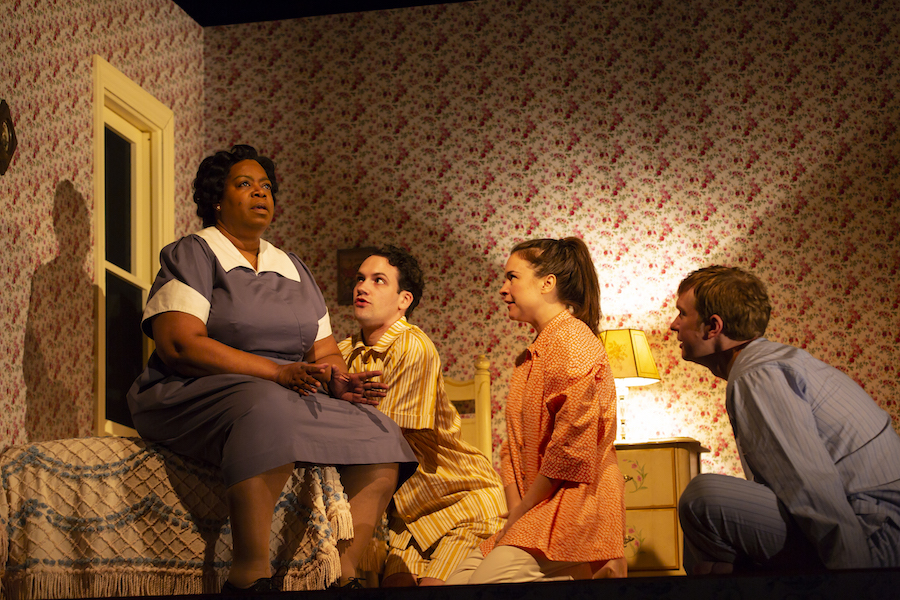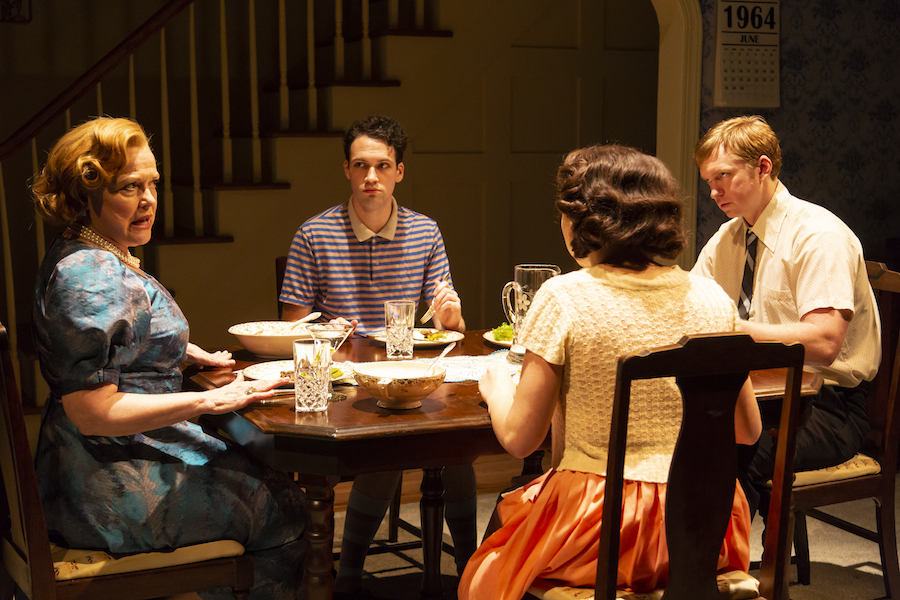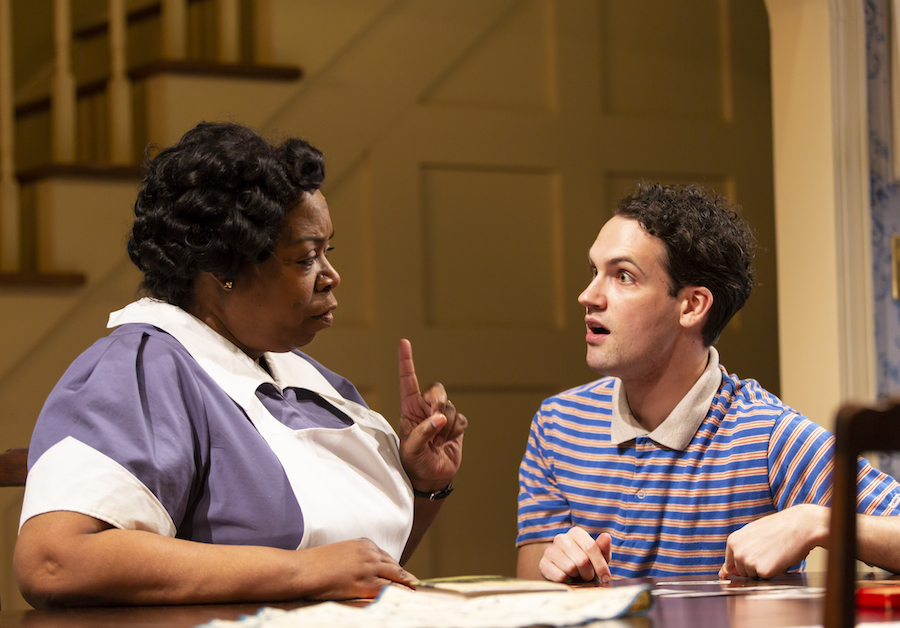
Long Wharf Theatre | Arts & Culture | Theater

| Benja Kay Thomas, Jacob Perkins, Leah Karpel, Roderick Hill. T. Charles Erickson Photos. |
There’s something strange festering in Jackson, Miss. Empty houses catch fire and grow back at twice their size. Boys disappear when they heed the call of freedom, and turn up dead and decaying months later. The bedsheets have hands that can pry bodies open then close them shut. And history, real history, sounds like even the walls are screaming, oozing an oily black sludge as something terrible tries to get out.
That thrumming, nauseating, inevitable pulse of history defines Boo Killebrew’s Miller, Mississippi, running now through Feb. 3 at Long Wharf Theatre’s Stage II. A contemporary Southern Gothic, the play is chilling and majestic all the way through, a reminder that there are those who bend the moral arc of the universe towards justice, and those who will fight against it until they die.
Tickets and more information are available here.
Directed by Lee Sunday Evans, Miller, Mississippi traces one family through three and a half decades of social upheaval in the Deep South, watching them grow from rollicking, sweet youth in 1960 to middle-aged and bitterly opinionated in 1994. From almost the outset, Miller children Thomas (Roderick Hill), Becky (Leah Karpel) and John (Jacob Perkins) and their mother Mildred (Charlotte Booker) are haunted by the memory of their father, a state judge who has seen the ugly within himself, and chosen to freeze the frame right there, rather than let the course of history play out.
While Mildred clings to southern gentility—at both great cost and occasional hilarity—their maid Doris Stevenson (Benja Kay Thomas) does most of the actual mothering, reprimanding the children for bad behavior, cooking their daily meals, pressing their clothes, giving them impromptu vocabulary lessons and unspooling ghost stories before they go to bed each night.

Her care for them is crushing: on her body is etched the cost of invisible and undercompensated labor, the history and trauma of black bodies in white homes, the exhaustion that comes from keeping one’s silence to keep both one’s job and one’s life. Rarely do we hear about her own son William, a central character in the show who we never see onstage, but feel for deeply by the end of the show.
Inside her manicured house, Mildred wants to hold tight to tradition: of white power, of unspoken secrets and nap times that smell like whiskey bourbon, of her own steely humiliation. But outside, change is coming, a push to integrate schools and register voters on the horizon whether she or any of her children like it or not. In a trance-like, syncopated dance, Mildred and Doris tear back the years from calendars that hang on the stage, newscasts cycling through time as the months and years fall away.
And we find ourselves asking: will these young minds welcome a new vision for their state, or do everything they can to keep it as it is? Will they keep telling the same ghost story, or flip it on its head?
For Killebrew, who began writing the play during the 50th anniversary of Freedom Summer in 2014, it’s a delicate ballet, equal parts horror and history. In 1960, the country may have passed the Civil Rights Act, but legislators often failed to enforce it, or fought actively against it. A year later, James H. Meredith entered the University of Mississippi as its first Black student, an enrollment both the university and the state had fought the courts to prevent. Then in 1964, Mississippi was ground zero for Freedom Summer, an initiative that both registered thousands of Black voters, and left three civil rights workers dead that June.
That’s just the first four years of the play. Time is galloping forward, and the Millers have to make a choice. Or many choices. Because they cannot, whatever they do, get left behind.
.jpg)
Onstage, the calendars—there are two, posted on walls of the first floor—become the perfect vehicle to communicate these leaps in time. The calendar tears, and Mildred is knitting furiously in front of the television, asking Doris for a nod or murmur of agreement that will normalize her point of view (which, spoiler, is never not racist). It tears, and Thomas’ hand is up his sister’s pajama leg, demanding her silence. It tears, and Becky is squirming in her school uniform, trying to get out of cotillion in what we know is a losing battle.
Or it tears, and John is learning about civil rights for the first time, a lesson he does not get at home or at school because that’s the way it is in Jackson. It tears again, and he has failed to understand that there is harm in his eagerness to organize, because the family from which he hails is a powder keg.
In the audience, we see how small aggressions bloom into larger ones, 34 years compressed into two and a half hours. In a particularly telling sequence, Thomas is expressing his fear of Black boys, the n-word hanging heavy in the air. What seems like minutes later (it is, of course, actually years), he has weaponized it, taking a page from Birth Of A Nation because he’s looking out “for our way of life.”
“You don’t know what it’s like out there,” he tells Mildred. We can almost taste the hate, bitter and calcified, between our own gritted teeth. “They’re getting bigger and bigger and they ain’t stopping. They’re going to take all of it away.”
In a testament to both playwright, cast and creative team, Miller is hard to watch, but harder still not to. Killebrew writes with a nuance and dark, bitter humor that the cast inhales—much more easily than a sea foam salad they must eat—bringing a history vividly to life.

They’re not easy roles: Becky and John withstand sexual and homophobic violence, making themselves small and scarce in a way that seems exhausting to do night after night. As Thomas, Roderick Hill has basically been asked to play the poster child for Dylan Roof, and he rises to the challenge every time.
As Mildred, Booker is a boulder, squaring her body against the tide of change with everything she’s got (and rarely, if ever, with a hair out of place). She has brought to Mildred a delicious complexity: we take her as a little bit of an airhead at the beginning of the show, only to understand much later that she holds tradition so very dear because she knows how to work the system, and is exactly where she thinks she’s supposed to be.
Across from her—often literally—Benja Kay Thomas is a powerful Doris (and briefly, a hospice worker named Ruby), communicating more in her body language than the script gives her words to. In this world as in ours, Doris isn’t allowed to be angry—that would violate some unspoken rule, where the comfort of her employers is the ostensible key to her own professional happiness.
The house, too, becomes a sort of unspoken character. Voices of newscaster David Dennis, activists Stokely Carmichael and Dr. Martin Luther King, Presidents John F. Kennedy and Ronald Reagan flow from a black and white television set that is almost always on. Becky is constantly moving her childhood bed or changing the locks on her door, as if some rearrangement of this old history will soothe all the Miller ills. When termites attack the foundation of the house, it seems like a very apt metaphor for a family that has fractured beyond crisis.
It makes for a work that may be wrapped in history, but inserts itself right into the present. Yes—Miller is very much a play about civil rights and the weight of white power, and it joins this month’s performance of Rasheeda Speaking at Collective Consciousness Theatre (CCT) as a strong theatrical case for reparations. But Killebrew is an intersectional writer: she posits that Doris’ true freedom also means better mental healthcare and an end to sexual violence for Becky; it means a bigger net to catch John when he falls. It means that Thomas does not amount to anything at all, forgotten as the hands of time move on without him.
In a stunning sequence at the end of the play, Killebrew denies us that pleasure. In a play wrapped in history, after all, that's not the ending that would ring true. The year is not 1960 or even 1994 but 2019, and there are still echoes of white terror everywhere we look. Maybe a change is gonna come, but we still have to will it with everything we’ve got.

